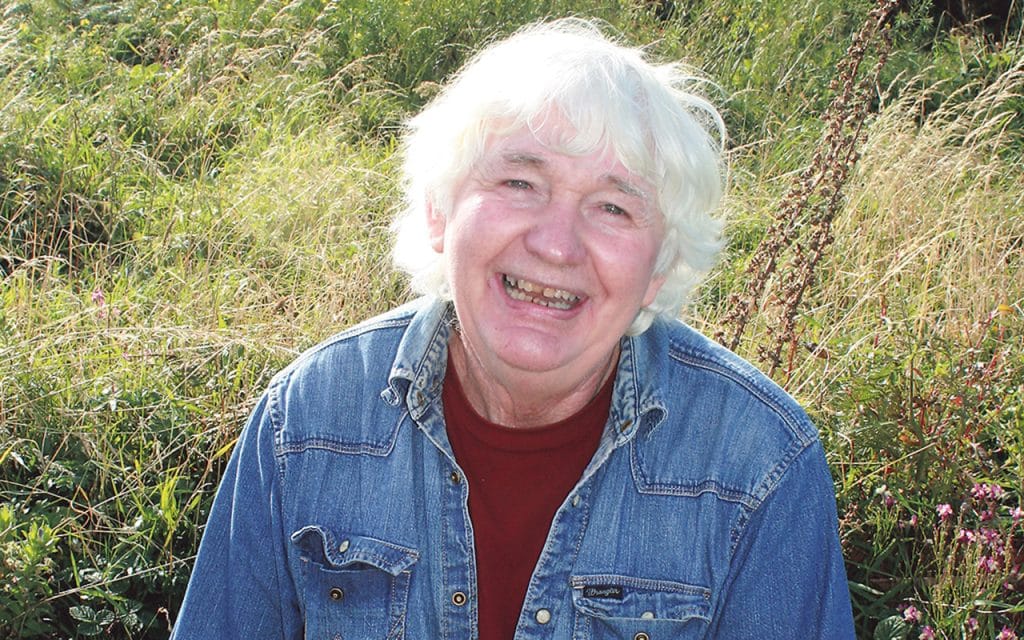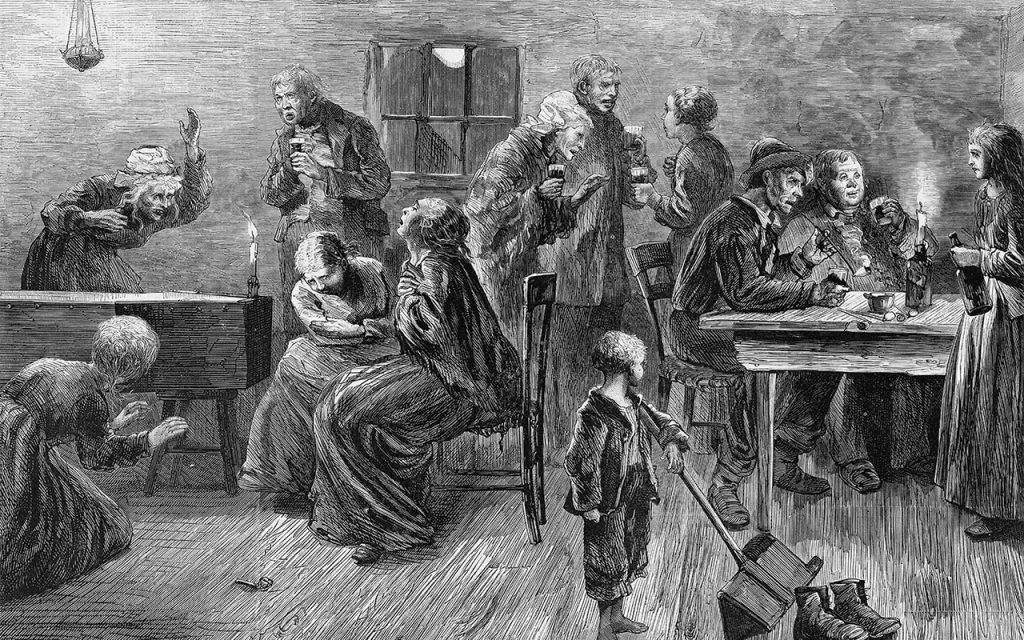A much-loved and eccentric character down Beara way, Mitey McNally is a fisherman, activist, tireless reader and lover of music and art who describes himself as a “a bit of a Walter Mitty type.” At 70, Mitey remains a passionate advocate for protecting the landscape of his native Beara, his oft-repeated catchphrase ‘there’s no life…only wildlife’ hanging proudly on the wall of his little wooden cabin in Garnish. From a hilltop overlooking Garnish pier looking across the bay to the spectacular Skelligs, as morning rolls into afternoon, Mary O’Brien enjoys tea, a chat and Mitey’s infectious enthusiasm for life.

Mitey McNally was born in 1954, in a time when life on the Beara Peninsula was simple but harsh. His father worked for the County Council, one of the few reliable jobs in the area. Beara in those days was a place where you grew up learning how to fend for yourself, particularly when it came to fishing, a trade passed down through generations.
After a delayed diagnosis with diabetes in his teenage years, Mitey began fishing young and found himself aboard trawlers by the time he was in his early 20s, chasing mackerel from Dunmore East to Galway. He recalls the golden days of Irish fishing in the ‘70s when “there were 89 fishermen down on the pier in Garnish,” and how the arrival of the first freezer truck from Holland revolutionised the industry. “We put over 600 boxes of fish on that truck, and it went straight back to Holland,” Mitey says with pride. “Before that, we had small lorries, but that day, there were 2,400 boxes landed in Garnish—best day’s fishing ever.”
Although he enjoyed life at sea, by 1986, his diabetes was a concern, and Mitey gave up fishing to protect his health. The possibility of a medical emergency while miles from shore weighed on him. “I was a thundering whore when I was younger,” he says with a laugh, “but it wasn’t the mischief that worried me. It was the thought of something happening out there, the responsibility of getting a helicopter to come out and take me off the boat.”
An avid reader, Mitey decided he wasn’t going to risk losing his eyesight to diabetes. “So, I came home and started looking after myself,” he says. While it was a difficult transition for a man used to the wide-open sea, Mitey found solace in books and in his growing passion for theatre.
That passion came to life in 1987 after a stint in Paris. Mitey had gone to visit his sister, Mary, who had married a French linguist, and ended up staying for several months. During his time there, he was struck by the difference in how languages shaped people’s perceptions of the world. His sister and brother-in-law had translated Brian Friel’s ‘Translations’ into French, and Mitey saw firsthand how the play could resonate with an audience, even when stripped of its native tongue. “It’s the best play I’ve ever seen,” he says. “I came back home and gathered a group of locals to try and produce it here. We were going to perform it outside on Dursey Island, but it never happened. I had to go back to fishing for a while.”
Mitey’s love for theatre and literature is just one part of what he calls his “Walter Mitty tendencies.” Although a bit of a dreamer, unlike Mitty, Mitey’s dreams have taken root in the real world. After giving up fishing for good, he founded a youth group in 1988 for local children, fostering their interest in theatre and art. “I’ve always believed we need to teach philosophy to children,” he says. “Not religion, but how to think for themselves.”
His passion for preserving the local landscape and culture is just as strong. Over the years, Mitey has been an outspoken opponent of the overexploitation of our seas by larger fishing vessels. “Is there even a mackerel quota still in existence in Garnish today when none have been caught in the last nine or ten years?” he asks. He has also been resistant to fish farming in Beara, citing the environmental damage caused by lice and chemicals such as astaxanthin that cause the pink-red colour in salmon. “People say, ‘There’s Mitey McNally again, screeching about fish farms,’ but I’m passionate about protecting this place,” he says. For him, the landscape is a living history, written into every field and place name, a heritage that needs to be preserved.
Mitey’s activism has also brought him into the political arena. When a coach park was proposed near his home, Mitey and a few others fought back in 1990, organising a local meeting and inviting Mary Robinson, then running for president, down to Allihies, where she launched her presidential campaign. The meeting was successful: the coach park never went ahead, Robinson was inaugurated as the seventh President of Ireland that year, and Mitey’s activism blossomed from there, including hosting a conference on rural sustainability. His dedication to community development eventually caught the attention of Sr. Stan Kennedy, who secured EU funding for local projects such as the Irish Rural Link.
But Mitey’s life hasn’t been without personal challenges. Three years ago, he had his right leg amputated due to complications from diabetes. Yet, he remains remarkably upbeat. “You’re only as old as you feel,” he says with a laugh. “Which is about 12 or 13, I think.” He jokes about how his home is often compared to a train station for the number of visitors who pass through.
Shaped by the many ‘blow-in’s’ who were drawn to the area in the 1960s, Beara, and Allihies in particular, going back to the time of the copper mines and influx of Canadian miners, is renowned for its cosmopolitan spirit. “They integrated with us or we integrated with them,” shrugs Mitey. “Either way, their influence has enriched the local community.” By the 1980s, Beara was home to some of Ireland’s top artists, Charlie Tyrell and Mick Mulcahy, as well as notable figures like Tim Goulding and Cormac Boydell. Mitey shares how many of the older people in the community, including his own mother in her mid-80s, have embraced art, taking classes and discovering a passion they never knew they had.
Today Mitey lives in a wooden cabin looking out at his family land, 32 acres, which shrinks or grows, depending on whether the tide is in or out. He has raised two children, Aoife and Cormac, and his shelves are lined with books from Russian literature to Irish theatre. His favourites include Mikhail Sholokhov’s ‘And Quiet Flows the Don’ and Heathcote Williams’ ‘Whale Nation’ a hymn to the majesty of the world’s largest mammal.
“I suppose I’m a bit of an eejit, really,” Mitey says with a smile, “but I’ve had a good life. And I wouldn’t change it.” For a man who calls himself a Walter Mitty, Mitey McNally has left an indelible mark on the land and the people of Beara.



